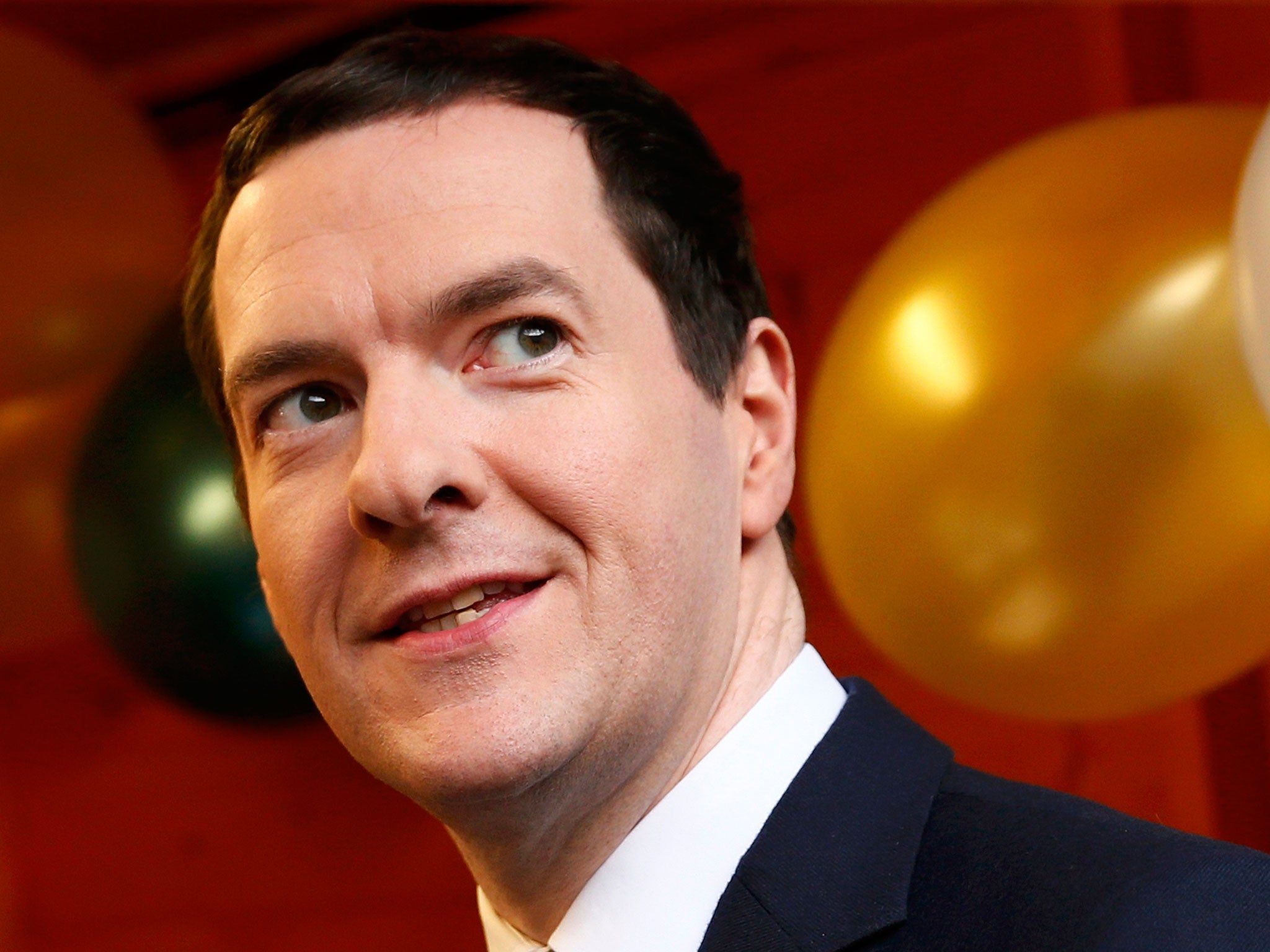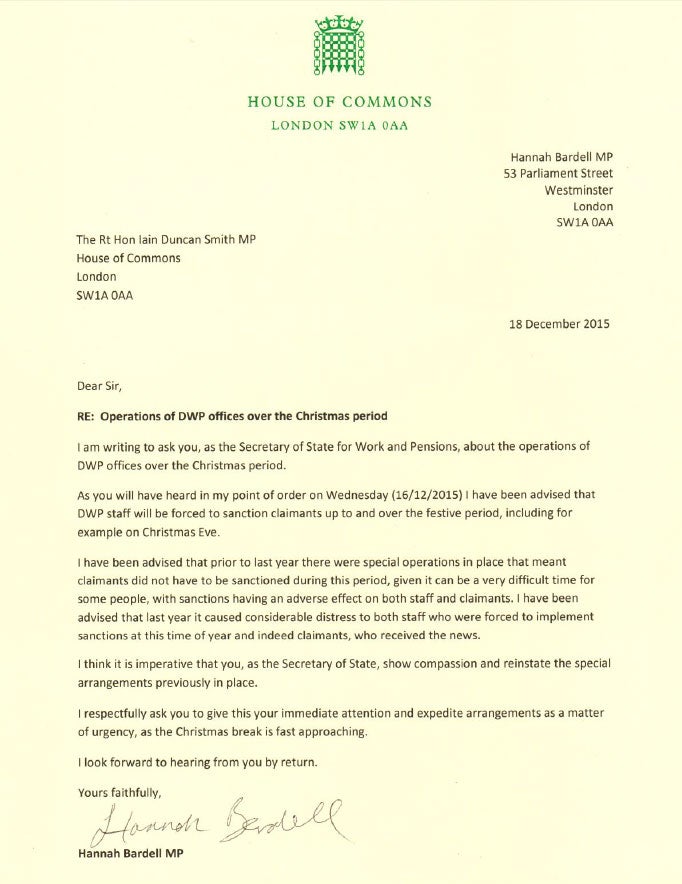Jobless and disabled people could have benefits stopped on Christmas Eve under ‘tough new sanctions regime'
Exclusive: The SNP claims the Government has quietly scrapped a system which spared claimants from the worst hardship at Christmas - something the Department for Work and Pensions denies

Your support helps us to tell the story
From reproductive rights to climate change to Big Tech, The Independent is on the ground when the story is developing. Whether it's investigating the financials of Elon Musk's pro-Trump PAC or producing our latest documentary, 'The A Word', which shines a light on the American women fighting for reproductive rights, we know how important it is to parse out the facts from the messaging.
At such a critical moment in US history, we need reporters on the ground. Your donation allows us to keep sending journalists to speak to both sides of the story.
The Independent is trusted by Americans across the entire political spectrum. And unlike many other quality news outlets, we choose not to lock Americans out of our reporting and analysis with paywalls. We believe quality journalism should be available to everyone, paid for by those who can afford it.
Your support makes all the difference.Jobless and disabled people could be stripped of their benefits this Christmas under a strict new sanctions regime for the festive period, it has been claimed.
In an apparent hardening of the Government’s attitude to welfare, those who miss a job centre appointment, interview or work capability assessment in the immediate run-up to the holidays could now be told the news on Christmas Eve itself.
The Independent had previously reported the Department for Work and Pensions (DWP) would be running a “business as usual” approach to Christmas this year, and was accused of taking a “Scrooge-like approach” to the season.
In new claims denied by the DWP, the SNP say this will be only the second year the approach has been taken, after a series of unwritten “special operations” were scrapped that previously protected claimants from having their Christmases ruined.
The party said concerns were raised by DWP staff themselves, who told the SNP they were made to call people up with bad news on Christmas Eve for the first time last year, and were unhappy they had to implement the alleged change in policy.
'Scrooge-like approach'
Hannah Bardell, an SNP member who raised the issue in Parliament last week, has now written to the Work and Pensions Secretary Iain Duncan Smith urging him to “show compassion and reinstate the special arrangements previously in place”.
In a letter seen by the Independent, she expressed concern that DWP staff “will be forced to sanction claimants up to and over the festive period, including for example on Christmas Eve”.
Ms Bardell wrote that the previous grace period was in place because “it can be a very difficult time for some people, with sanctions having an adverse effect on both staff and claimants”.
“I have been advised that last year it caused considerable distress to both staff who were forced to implement sanctions at this time of year and indeed claimants, who received the news.”

The number of people facing sanctions in the coming days is difficult to predict, as the DWP does not provide a daily breakdown of its figures.
But numbers on the department’s own website show that last December, sanctions were issued to 34,958 people claiming Jobseeker’s Allowance and 3,274 seeking ESA – disability benefits.
Mencap, a key member of the 60-charity Disability Benefits Consortium, said it was contacted last year for the first time by someone with a learning disability who was told his benefits would be stopped on Christmas Day.
Dan Scorer, Head of Policy at the learning disability charity, told the Independent that if the SNP’s claims were true, “taking away the Christmas grace period for sanctions risks pushing people with a learning disability into financial and emotional crisis at a time when the normal networks of support are not easily accessible”.
He said: “The Government should be creating a benefits system that gives people financial support to lead independent lives and move towards and into work. As it stands they risk having the opposite effect.”
A spokeswoman for the DWP denied that the department had ever implemented special measures or a "grace period" where claimants were spared bad news over the Christmas.
Confirming there was a possibility people would be told they were being sanctioned on Christmas Eve this year, she said the department had no figures on the number of people who might be affected.
In a statement, the DWP said: “Any suggestion that jobcentre staff are forced to sanction claimants is completely false.
"Jobcentres are open at select times over the holidays to give people the opportunity to seek employment and careers advice; there are no ‘signing on’ appointments over this period.
“The number of sanctions are falling and they are only ever imposed as a last resort if someone fails to demonstrate reasonable action to find work.”
'Flaws in the sanctioning process'
The SNP’s claims came as an influential Commons committee released a report exposing a number of flaws with state benefit delivery.
The Work and Pensions Committee found that, on average, 30 per cent of Jobseeker’s Allowance sanctions were successfully appealed, rising to more than 60 per cent for Employment and Support Allowance.
In today’s report, it ordered the Government to deal with “flaws in the sanctioning process”. “DWP must address the quality of original decisions in order to maintain a downward trend in the number that are overturned,” it said.
Previous findings from the committee have seen Mr Duncan Smith pledge a system where those being sanctioned are warned two weeks beforehand and given a change to appeal – but such reforms will be trialled in 2016, too late for those who face having this Christmas ruined.
Other charities have repeatedly expressed concerns over how benefit sanctions impact the poorest in society – and said this was never more evident than during the Christmas period.
Alan Markey, the chair of the National Association of Welfare Rights Advisers, told the Independent his organisation was “opposed in principle to the sanctions regime”.
“The experience from our advisers nationally is that sanctions disproportionally affect vulnerable groups, such as people with mental health issues and other health problems, and that they do not achieve their intended aims. All they do is increase hardship and poverty.”
Alison Garnham, the chief executive of the Child Poverty Action Group, said it was “high time the [sanctions] system was overhauled”.
She said: “Whether it’s over Christmas or at other times, families are being left destitute by an overly harsh regime that can leave them with a choice between eating from a food bank or not eating at all.”
And Kirsty McHugh, chief executive of the ERSA trade association representing welfare to work providers, said: “Employment support works best when there is a positive relationship between advisor and jobseeker. Sanctions should only ever be used as a last resort. It therefore seems highly unlikely that sanctions at Christmas will be in the best interests of anyone.”
'Financially and emotionally ruining Christmas'

James Smith, 38, is one of many people across the country who will be required to attend a Work Capability Assessment (WCA) this Christmas Eve.
He suffers from a very severe form of ulcerative colitis, an illness which forced him to give up a career in youth work which, in 2010, saw him meet Prince Charles as an ambassador for the Princes Trust.
Mr Smith will be accompanied by his father during his WCA, after a series of bad experiences with the DWP’s chosen contractor “Maximus Health and Human Services”.
Speaking to The Independent, he said changes to government support for the disabled in 2014 had set the country back 40 years.
“How would it make you feel, to have a chronic, incurable condition with 21 years of medical notes and be treated as though you are lying by a company that would rather lie than educate themselves on disability.
“To not be allowed to enjoy Christmas because you have to attend an assessment which will most likely dominate the whole of Christmas Eve.”
Mr Smith said he was lucky to have a strong support network behind him, and requires the WCA sign-off in order to have his state pension approved rather than to receive immediate benefits.
But he said he imagined the threat of sanctions to others in a similar position would “financially and emotionally ruin Christmas for people who have no way to hold the DWP accountable”.
“They have to show more compassion,” he said. “Even in the First World War, a truce was called to stop the killing at Christmas. I am angry and saddened that those with disabilities and chronic illness mean so little now to the rest of society.”
Join our commenting forum
Join thought-provoking conversations, follow other Independent readers and see their replies
Comments